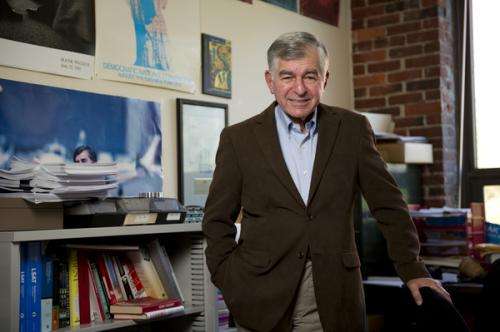3Qs: Will Sandy have an impact on the election?

Just five days remain until the nation elects its next president. But Michael Dukakis, Distinguished Professor of Political Science and the 1988 Democratic nominee for president, says the flawed Electoral College system could prevent Hurricane Sandy's aftermath from having any major impact on the presidential race.
How might Hurricane Sandy, which arrived just over a week before Election Day, sway the outcome of the presidential race?
I didn't think at first that it would have any great effect, but now that New Jersey's governor has weighed in with high praise for President Obama, it may well make a difference. It's an opportunity for the president to show how effectively he can manage a crisis like this, and people are paying attention. The failure of both Bushes to handle a major storm well had a very serious impact on their political futures —especially Bush One, who badly handled Hurricane Andrew in south Florida just before the 1992 election. Moreover, Romney was the guy who said that most of the responsibility for responding to disasters should be left to the states, not the federal government.
Voter turnout is going to have a lot to do with the field operations each campaign has on the ground, and I don't know if either campaign has a major presence in either New York or New Jersey; both of those states were supposed to be safe states for Obama, and not much campaigning was going to be able to swing them the other way. It could bring Pennsylvania back into play, where Romney has returned and Obama has a major field operation. Super PACs could make a real difference. They are pouring money by the millions into these states and buying ads where a lot of people—those with electricity—don't have much to do but watch television and wait for the worst to be over.
How might the storm's political impact be different if the presidency were decided by the popular vote rather than the Electoral College?
The popular vote doesn't mean much anymore. I think that's a tragedy. The candidates are spending all of their time in about seven states 'while 85 percent of the nation is standing by as spectators. There's no incentive for the candidates or the major parties get out the vote in the rest of the country. If every vote counted the same, things would be very different. The state parties would be extremely motivated across the country to get every voter to the polls. But that's not what's happening. Our current system is a distortion of what ought to be a healthy, active and democratic process.
We should have abolished the Electoral College 150 years ago. It's absolutely ridiculous that we're still picking presidents this way.
How might the American presidential election process be changed?
The is the mechanism that would be able to change things. The idea is to get enough states whose total electoral votes represent the majority a candidate would need to win the Electoral College. Then, on a state-by-state basis, pass legislation that would compel their electors to vote in whatever way reflected the national popular vote, even if it goes against how that particular state voted. Massachusetts has already signed on to it, as have eight other states. Under this system, every vote in every state would count the same,.
A lot of Democrats already support moving toward using the popular vote to decide the presidency. And if Obama won the Electoral College but lost the popular vote to Romney, that certainly could get many Republicans thinking along the same lines. Certainly, many of them are fond of the Electoral College after the 2000 election, but if a Democrat could win the Electoral College without a majority of the popular vote, it just might change their thinking.
Provided by Northeastern University



















